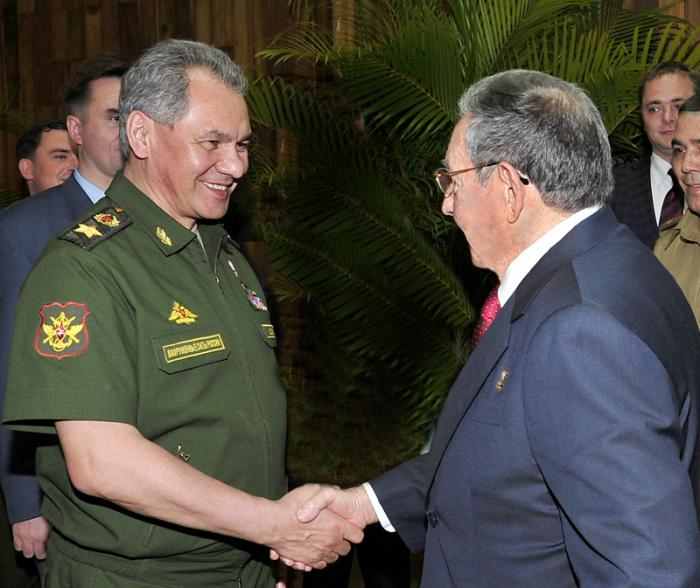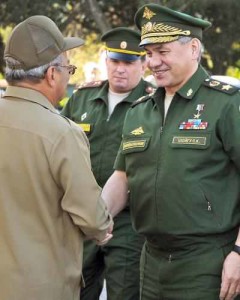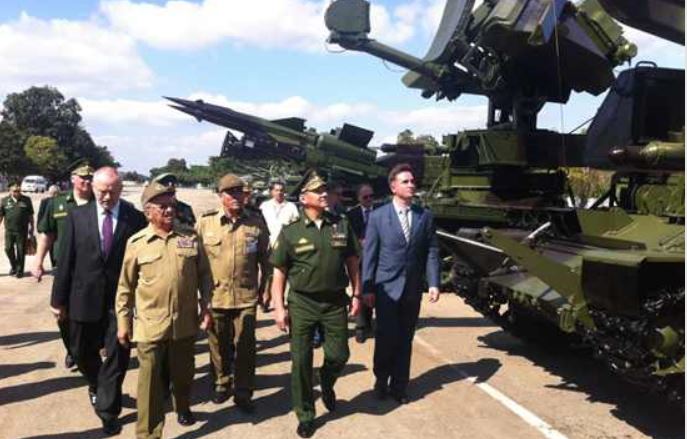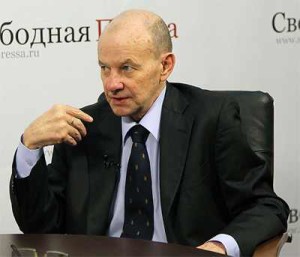
Shoigu, in Cuba, means business, Russian analyst says
Russia’s Defense Minister, Army Gen. Sergei K. Shoigu, arrived in Havana on Friday (Feb. 13) for two days of official business, after one-day stopovers in Venezuela and Nicaragua.

One of his firsts acts was to lay a wreath at the monument to the Russian servicemen who served in Cuba in the early 1960s. The memorial site, outside Havana, includes a cemetery for 68 servicemen who have died in Cuba since then.
He also laid a wreath at the tomb of Cuban independence leader Antonio Maceo.
Afterward, Shoigu was taken on a tour of the Cuban Army’s tank division by his Cuban counterpart, Gen. Leopoldo Cintra Frías, and the deputy defense minister, Gen. Álvaro López Miera.
According to the Russian Defense Ministry, Shoigu pointed out that many of the pieces or equipment are unique, in that they have been modified by Cuban armorers. He described them as “hybrid units,” for example, rebuilt T-34 and T-55 tanks of 1940s vintage.

RUSSIAN SCHOLAR ANALYZES MINISTER’S TRIP
As Shoigu arrived in Havana, a renowned Russian politologist, Vladimir Anokhin, analyzed the purpose of his mission.
Anokhin, a political scientist who is vice president of the Russian Academy of Geopolitical Problems, wrote in the website “Current Commentary” that Shoigu’s trip through three Latin American countries “can be a very fitting response to the United States in its attempts to expand its influence in Europe.”

“If we take into account our military-technical cooperation with all other countries, Venezuela is with us in first place,” he wrote. “That is a historical fact. And now we come to new frontiers of cooperation with Latin America.”
Alluding to agreements reached with Venezuela and Nicaragua on the use of ports and airfields for resupply, Anokhin wrote that “we have achieved some serious results, a deployment of our bases — at least creating the conditions for our presence in the region.”
“I don’t think that Shoigu is on a tour of Latin America,” Anokhin wrote. “This is a working visit. Defense ministers do not make courtesy visits. Defense ministers are case-specific. Most likely, some plans have already been made between the two countries, involving a further development of military cooperation. Their form and extent are yet to be seen.”
However, Anokhin noted, “I would not exaggerate Shoigu’s trip and predict a hypothetical ‘Caribbean crisis.’ Presumably, this is a very smooth and gradual development of our influence in Latin America, especially since the United States has created all the conditions for the presence of opponents.
“And Russia in this case is — if not the guarantor of security — a fairly personal partner to the Latin American republics against the United States.
“At the same time,” the expert went on, “I do not expect any major changes in our military-technical cooperation with Cuba now that the United States is trying to establish diplomatic relations with Cuba.
“Cuba can play on both fields. On one hand, it can have a relationship with the United States in terms of its economic and diplomatic interests. But the Cubans are well aware that the Americans are not the fellows with whom you can really be friends.
“So, they will look upon Russia as a country that has always helped them in all matters. And I think that Russia will be a major asset to Cuba in its relations with the United States.
“Therefore,” Anokhin concluded, “Cuba will not only strengthen relations with Russia but will also make it the guarantor of economic and political relations with the U.S. so it won’t swallow the island. That is to say: Cuba in any case will remain in Russia’s zone of influence.”
[Photo at top of Raul Castro and Gen. Shoigu.]

